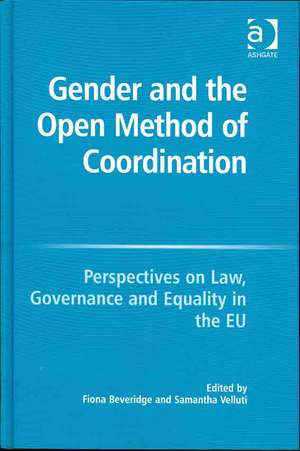Gender and the Open Method of Coordination: Perspectives on Law, Governance and Equality in the EU
Autor Samantha Velluti Editat de Fiona Beveridgeen Limba Engleză Hardback – 28 sep 2008
Preț: 698.17 lei
Preț vechi: 821.37 lei
-15% Nou
Puncte Express: 1047
Preț estimativ în valută:
133.60€ • 139.84$ • 111.19£
133.60€ • 139.84$ • 111.19£
Carte tipărită la comandă
Livrare economică 31 martie-14 aprilie
Preluare comenzi: 021 569.72.76
Specificații
ISBN-13: 9780754673439
ISBN-10: 075467343X
Pagini: 226
Dimensiuni: 156 x 234 x 14 mm
Greutate: 0.45 kg
Ediția:1
Editura: Taylor & Francis
Colecția Routledge
Locul publicării:Oxford, United Kingdom
ISBN-10: 075467343X
Pagini: 226
Dimensiuni: 156 x 234 x 14 mm
Greutate: 0.45 kg
Ediția:1
Editura: Taylor & Francis
Colecția Routledge
Locul publicării:Oxford, United Kingdom
Notă biografică
Fiona Beveridge is Professor of Law at the University of Liverpool. Her research interests are in the areas of International Economic Law; Feminist Legal Studies; and EU law. She has written extensively on these and related areas. Samantha Velluti, is a Lecturer in Law at the Lincoln Law School, University of Lincoln, UK. Dr. Velluti's publication and research interests include EU governance and open method of co-ordination; EU social law and policy; gender equality; and migration.
Recenzii
'With contributions from the leading researchers in the area, this is a valuable, inter-disciplinary and critical discussion of how a new method of EU policy making and governance reflects specifically on the formulation of gender policies in the EU. It is a significant and ground-breaking work which makes a useful empirical contribution to an assessment of the OMC and its impact on the modernisation of social policies in the EU.' Erika Szyszczak, University of Leicester, UK
Cuprins
Chapter 1 Introduction – Gender and the OMC, Fiona Beveridge, Samantha Velluti; Chapter 2 Implementing Gender Equality and Mainstreaming in an Enlarged European Union: Prospects and Challenges, Fiona Beveridge; Chapter 3 Employment Policy, Women’s Labour Market Activation and Demographic Trends, Roberta Guerrina; Chapter 4 The European Employment Strategy and the Europeanization of Gender Equality in Employment, Ayse Idil Aybars; Chapter 5 The OMC and the EES: Broadening the Possibilities for Gender Equality?, Julia S. O’Connor; Chapter 6 The OMC, Gender Policy and the Experience of Poland as a New Member State, Ma?gorzata Fuszara; Chapter 7 OMC in the Context of EU Gender Policy from the Point of View of New EU Member States, Kristina Koldinská; Chapter 8 Gender Equality and Mainstreaming in the Re-articulation of Labour Market Policies in Denmark and Italy, Samantha Velluti; Chapter 9 Is the OMC a Provider of Political Tools to Promote Gender Mainstreaming?, Amparo Serrano Pascual; Chapter 10 Gender and the OMC: Conclusions and Prospects, Fiona Beveridge, Samantha Velluti;
Descriere
Containing contributions by some of the best known researchers in the field, this volume draws on a range of disciplinary perspectives to examine the effectiveness of the Open Method of Coordination as a medium for the advancement of gender equality within the EU.










